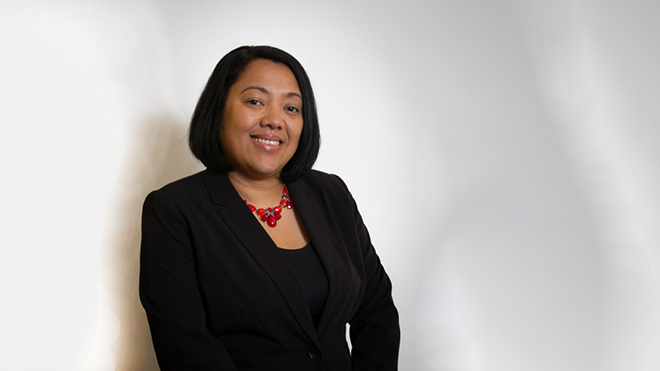
BECU SVP: Value Differences To Open Doors
For Asian/Pacific American Heritage Month, we talked with Bryan Lee MacDonald, a BECU Senior Vice President, about how connection and mentorship can help overcome barriers to professional growth.
Growing up in Texas, the child of Korean American parents, people often asked Bryan Lee MacDonald about his name.
When his father, Lee Kyoung Bok, was a young boy during the Korean War, he was separated from his family as they fled communist forces in what is now North Korea. Lee befriended and was eventually adopted by a U.S. Army soldier named Angus MacDonald.
It's an alternately heart wrenching and heartwarming story, but Bryan MacDonald is pretty sure no one would ask about his name if he didn't look Asian.
"I'm not very conscious in my day-to-day about my ethnic and cultural background until I reflect and think about it," MacDonald said. "Certainly, the ongoing violence against Asians have stoked continued internal reflection and dialogue with family and friends. Lately, I think about looking the way I do and the upbringing and experiences I've had and what those may have meant for me in my life and my career."
The Burden of Racism
MacDonald downplayed his experience of insensitivity and racism as infrequent, and, for the most part, relatively mild, but he recalled one incident that was especially hurtful. The Korean church his family attended was broken into, and racist language and sentiments were scrawled on the walls.
"I remember feeling shocked and confused about why someone would break into our church and use that language. They didn't know us," MacDonald said.
He saw a look of resignation cross his parents' faces, followed by a look of resolve as they began cleaning the graffiti off the walls.
"They had to move forward," he said.
MacDonald remembered another incident. Shortly after graduating from college, he was shopping in New Jersey with his mother, father and younger sister.
The employees in a shoe store had a system for identifying which customers got which shoes to try on: Instead of using names, they drew Asian caricatures of his family.
"We were livid," MacDonald said. "But that was relatively innocuous. We could have given them some slack, maybe, but maybe we helped them understand how people are affected and won't remain silent. Speaking up felt like the right thing to do."
Today, with reports of violence and incidents on the rise, and with the momentum of movements like Black Lives Matter, MacDonald realizes his experiences and his resulting feelings aren't isolated.
Internalizing Limits
MacDonald is reflective about "othering" — categorizing and marginalizing whole groups of people — and the accumulated effects of racism. Enduring othering and racism, combined with the difficulty of attaining management roles, people of color might begin to question what they're doing wrong, but the statistics suggest it's not them. Larger systemic issues are working against them and making it harder for them to advance.
Asian Americans tend to be more highly educated and have higher median incomes than any other racial group, yet they are the least likely group to be promoted to management, according to the Harvard Business Review, citing research by the Pew Center. They represent 12% of the country's professional workforce but only 1% of S&P 500 CEOs .
MacDonald grew up surrounded by messages that achieving success was the natural result of working hard and taking advantage of opportunities.
"It can be tough when you're growing up in a culture that emphasizes education and conformity being linked to success, but then you realize that's not all it takes," he said. "There can be a lot of shame that comes with not meeting those expectations."
MacDonald believes the factors contributing to professional limitations for Asian Americans are varied and nuanced.
"Behaviors, cultural influences and organizational dynamics are all factors that might be in play and contribute to challenges faced by Asians who are trying to advance," MacDonald said.
Bloomberg points to cultural stereotypes and conflicting Western ideas about leadership styles as challenges: "Asian values emphasize humility and deference to authority, whereas Western leadership centers on leaders being masculine, dictatorial and charismatic."
Different Cultures, Different Experiences
While high-level statistics can help explain some challenges, they can also perpetuate what is known as the model minority myth, which suggests all Asians are successful and don't need any help.
Asian Americans and Pacific Islanders are a diverse population of many cultures with descendants from the 48 countries that make up Asia, plus the Pacific Islands, including China, India, North and South Korea, Japan, Pakistan, Thailand, Vietnam, Guam, Hawaii, Burma, Samoa and the Philippines.
"Talking about Asians as one group is a shortcut that takes away from seeing the richness of different cultures and individuals," MacDonald said. "It takes away from an appreciation of people and seeing people at a deeper and more meaningful level."
It also erases the diversity in economic health experienced by different cultural groups.
Citing research from the Pew Research Center, MoneyGeek wrote: "...the Asian American and Pacific Islander community has the most significant income inequality, with the top 10% of Asian American earners making almost 11 times more than the bottom 10% of earners in a 2016 study."
Mentorship and Representation
MacDonald believes good mentors have contributed to his success.
"At BECU, leaders have demonstrated a commitment and an interest in seeing me develop, and I can't be more appreciative for those allies in my life and my career," he said.
Now, as a senior leader, he is in a position to mentor others and relate to those facing similar challenges.
"There is something really powerful in being able to relate to somebody who has walked a similar path as you," he said.
Organizational Support and Human Connection
Increasing diversity within an organization takes a combination of will among leadership and instituting inclusive hiring and retention workplace practices.
MacDonald also thinks it takes recognizing and valuing diversity of thought and communication styles.
"Over the years, I have appreciated feedback about how I can be more assertive and fit in with an organization's norms," he said, "but I also appreciate it when leaders understand what I'm bringing to a role individually, and when they value what my different cultural background and approach might bring to organizational dynamics and success."
As a leader, MacDonald makes it a point to recognize the value in others. He works to learn and understand the differences in how people approach work.
He believes one of the best strategies for creating an inclusive workplace is to build human connection.
"Getting to know people gets you away from generalizations," MacDonald said. "There's vulnerability and the potential for misunderstanding and pain along the way, but if you can spend time together and see each other, maybe that's the way towards a community where there's more real connection, understanding and representation."
Resources
- MoneyGeek: Managing Financial Challenges for Asian Americans and Pacific Islanders
-
Bloomberg: The Leadership Representation Ceiling for Asian Americans
-
Harvard Business Review: Asian Americans Are the Least Likely Group in the U.S. to Be Promoted to Management
-
Los Angeles Times: Op-Ed: Why successful Asian Americans are penalized at the workplace
-
Pew Research Center: Key facts about Asian Americans, a diverse and growing population
-
"Breaking the Bamboo Ceiling — Career Strategies for Asians" by Jane Hyun
The above article is intended to provide generalized financial information designed to educate a broad segment of the public; it does not give personalized financial, tax, investment, legal, or other business and professional advice. Before taking any action, you should always seek the assistance of a professional who knows your particular situation when making financial, legal, tax, investment, or any other business and professional decisions that affect you and/or your business.


